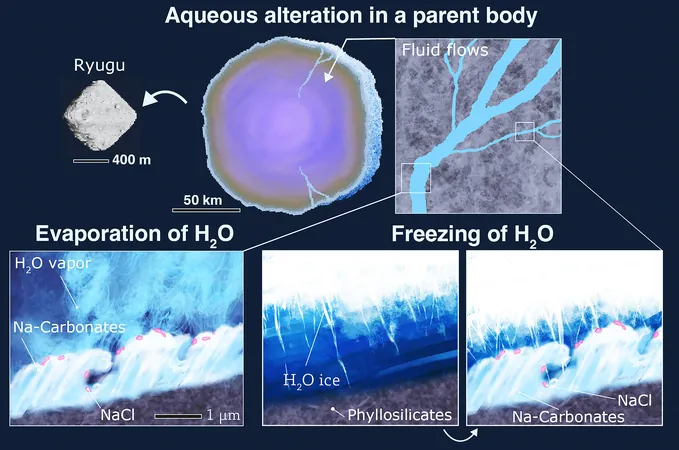
Unbelievable Discovery: Asteroid Ryugu Harbored Liquid Water Over a Billion Years!
2025-09-13
Author: Mei
Astounding Evidence of Liquid Water in Ryugu
Researchers have made a groundbreaking discovery, revealing that the asteroid Ryugu contained substantial amounts of liquid water not just shortly after its formation, but well over a billion years later! This revelation challenges previous assumptions about the water activity in the early solar system and suggests Ryugu's geological history is far more dynamic than previously thought.
Hayabusa2 Mission Hits the Jackpot
In December 2020, Japan's Hayabusa2 mission triumphantly returned samples from Ryugu, recovered in Australia. The mission aimed to bring back 0.1 grams of material but far exceeded expectations, collecting 5.4 grams from two different sites, including excavated fragments from 3.3 feet below the surface.
Isotope Analysis Confirms Water Presence
A meticulous study led by Tsuyoshi Iizuka from the University of Tokyo focused on the isotopic ratios within these returned grains. They discovered a remarkable signature of liquid water seeping through the asteroid's rock long after it had formed. This movement was potent enough to transport various elements into fractures, indicating an ongoing history of aqueous activity.
Rethinking Earth’s Water Origins
The findings imply that Ryugu's parent body might have held 20 to 30 percent water by mass, significantly revising estimations of how much water similar bodies contributed to Earth. This could mean that asteroids like Ryugu were crucial in delivering the water that formed our planet’s oceans.
The Mystery of Aging Rocks
Using radiometric dating, researchers found some grains appeared older than the solar system itself—a perplexing outcome. The anomaly stems from liquid water flowing through the rock, disturbing the distribution of lutetium and hafnium isotopes used for age dating, leading to skewed results.
Transformative Impact on Solar System Science
This research not only redefines our understanding of Ryugu but may also impact studies of other small bodies in the solar system. The work illustrates that water can persist within these celestial objects for extended periods, enhancing the chances that many asteroids delivered significant amounts of water to Earth during its formative years.
The Future of Astrobiology and Planetary Studies
The complexities unearthed by exploring Ryugu highlight the necessity of sample-return missions, offering invaluable insights that remote sensing cannot provide. Each grain of material gathered helps refine our understanding of the solar system's history and its potential for fostering life.
What's Next?
As we delve deeper into the potential of asteroids to host life-sustaining resources, this research sets the stage for future missions and explorations. The journey to unlock the secrets of the universe is full of surprises—stay tuned for more exhilarating discoveries!




 Brasil (PT)
Brasil (PT)
 Canada (EN)
Canada (EN)
 Chile (ES)
Chile (ES)
 Česko (CS)
Česko (CS)
 대한민국 (KO)
대한민국 (KO)
 España (ES)
España (ES)
 France (FR)
France (FR)
 Hong Kong (EN)
Hong Kong (EN)
 Italia (IT)
Italia (IT)
 日本 (JA)
日本 (JA)
 Magyarország (HU)
Magyarország (HU)
 Norge (NO)
Norge (NO)
 Polska (PL)
Polska (PL)
 Schweiz (DE)
Schweiz (DE)
 Singapore (EN)
Singapore (EN)
 Sverige (SV)
Sverige (SV)
 Suomi (FI)
Suomi (FI)
 Türkiye (TR)
Türkiye (TR)
 الإمارات العربية المتحدة (AR)
الإمارات العربية المتحدة (AR)